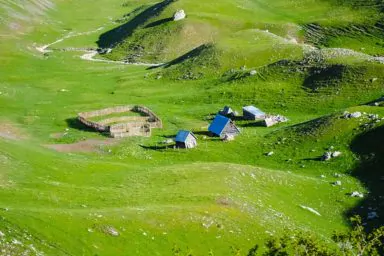
The majority of historians suppose that Montenegro population was formed as a nation in the XV century when the Serbians fled the country trying to escape from the Turks and hide in the mountains. Living there they mixed with local tribes, formed clans and became a separate nation with its own authentic culture. Though these clans were often at odds with each other, they immediately allied against aggressors but then dropped into old habits again.
The one who contributed Montenegro population to become an independent nation was Petar II Negosh-Petrovych – a public official and orthodox bishop of Serbian Orthodox Church. He was not only a philosopher and reformer but a well-known poet. Nowadays his poems are studied at schools, there are monuments to him all over the country and various souvenirs with his portraits are very popular with tourists. Montenegrins are grateful to him and they remember him and hold the memory of this great person.
Montenegro population – statistics
So now Montenegro population mostly consists of Montenegrins (about 45 %), Serbians (approximately 29 %), Bosnians (ap. 9 %) and Albanians (5 %). Besides you can meet there Croats, Russians, Slovenians, etc. In total there are about 650 thousand inhabitants in Montenegro. According to the Constitution of the country all nationalities are equal and have the same rights and duties.
The density of population is 50 persons per square kilometer. The country is on the 167 place in the world according to the current population size. The majority of Montenegrins are Orthodox Christians (70 %).
It’s rather interesting that Montenegrins demonstrate their nationality at the wedding. If the bridegroom identifies himself as a Montenegrin he will place the Montenegrin red flag with an eagle on the first car of the wedding procession. If he is a Serbian, there will be a red, blue and white Serbian flag there.
The character of the nation
Montenegrins are described as tall people with dark hair and eyes.
The first thing that everybody notes at once is slowness and even laziness of Montenegrins. They are not in a hurry, they don’t fuss about but prefer to deal with all problems over coffee and bagels speaking in measured tones.
You can often see two friends who have recently met each other and stopped for a chat straight on the road (even if they drove in different directions a minute ago). Of course, they will have a long talk learning the latest news about all their relatives and neighbours, and giving their best regards to them. It doesn’t matter even if they block the road – they will keep on chatting. In such a case it’s better to be patient. Remember that interpersonal and interfamily relationships are very important for Montenegrins.
One more attribute of Montenegro population is its warm hospitality. Guests are always asked to dinner and celebrations are really great. Wine and rakia (a kind of local vodka made of fruit, especially of plums) are served by all means. But take into consideration that Montenegrins seldom get drunk – you are unlikely to meet a drunken person here.
People in Montenegro keep up old customs and traditions. They widely celebrate local holidays, are religious and, on the whole, provide back-to-basics lifestyle. They highly appreciate family values and you can often meet here large families with many children. Striking is that fathers play and walk with their children even more than mothers do, and, of course, it prepossess greatly.
Do try and visit Montenegro – and you’ll not only enjoy its beautiful and charming views but get acquainted with the hospitable people living there.


